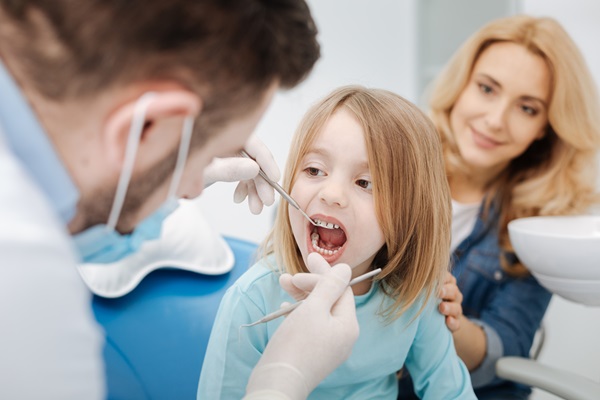When Should a Child See a Family Dentist?

Most parents do not take their children to see a family dentist until they are well over two years of age. Dental professionals recommend that a child should visit the dentist within six months after teething starts. Baby teeth often start coming in from six months of age. Continue reading to learn more about children’s dental appointments.
Visiting the family dentist
If the child’s first dental appointment is only a meeting with the dentist, then taking them at age two might be more realistic and appropriate. However, that first appointment might be because of an emergency. Children can be unpredictable, and if they had a bad fall at the playground and chipped or broke their teeth, their first appointment might be one born of trauma. Now, the chances are that the child may have difficulty letting a stranger touch or treat them.
Sadly, these cases occur regularly, where a child’s first dental visit is because of a dental emergency, and it is almost impossible to get the child to cooperate. Often, drastic measures need to be taken so the dentist can examine the child and repair the damaged tooth. This is why family dentists usually recommend that parents bring the child to the dental office during their dental appointment.
The purpose of the child’s dental appointment
The first appointment is not exactly for any major procedure. It is more for getting the child accustomed to the dentist’s office and exploring the different tools, and probably even sitting in the dental chair. The dental office is designed to keep the child comfortable, with lots of games, toys, and other entertainment options to keep them engaged. When the child is at ease, they might be more willing to let the dentist take a peek into their mouth.
The first appointment serves different purposes. It gets the child familiar with the dental team and office setting in a non-threatening setting – building trust is easier. Also, it allows the dentist to perform a quick dental exam. They will examine the child’s jaw, teeth, gums, and bite alignment, looking for signs of tooth decay or issues that may affect normal oral development or speech. The dentist will also discuss good oral hygiene, and the child will learn how to brush and floss in fun ways. This approach ensures that children cultivate a habit of preventive dental care throughout their lives.
The frequency of dental appointments
After the first appointment, dental professionals recommend that children visit the office every six months, except for an emergency. The dentist will continue from the last appointment and determine if the child needs any form of preventive or interventive care. For instance, they might recommend dental sealants or fluoride application. When the child clocks three, they have full dental appointments, which may include dental x-rays and dental cleaning.
In conclusion
It is important that you do not wait until there is a dental emergency before taking the child to visit the family dentist. Book an appointment as soon as the child’s teeth start coming in.
Request an appointment here: https://www.bdentalspa.com or call b Dental Spa at Norwood at (201) 379-9312 for an appointment in our Norwood office.
Check out what others are saying about our dental services on Yelp: Family Dentist in Norwood, NJ.
Related Posts
Getting a professional dental checkup and cleaning every six months is not just important for adults. Children need this type of care too, and a family dentist can provide it. There are several reasons parents should schedule routine dental appointments for their children early in life. Doing so can help kids maintain good oral health…
An immediate visit to an emergency dentist becomes necessary when severe tooth pain or infection disrupts your comfort and overall quality of life. This dental professional provides immediate evaluation and relief, particularly when a root canal is required to preserve a damaged or infected tooth. Root canal treatment from an emergency dentist can help alleviate…
Clear aligners are becoming increasingly popular and many are choosing them over traditional braces. They offer a range of benefits, which include a discreet treatment option, the ability to remove them while eating and brushing teeth and faster treatment times on average. Learning more about how clear aligners differ from traditional braces and why so many…
Root canal retreatment can prevent infection, pain, or swelling from compromising oral health. A root canal saves a tooth by removing inflamed or infected pulp and sealing internal spaces, but certain situations call for retreatment to restore stability. Recognizing the signs that this treatment may be urgently necessary allows a dental provider to act quickly…
